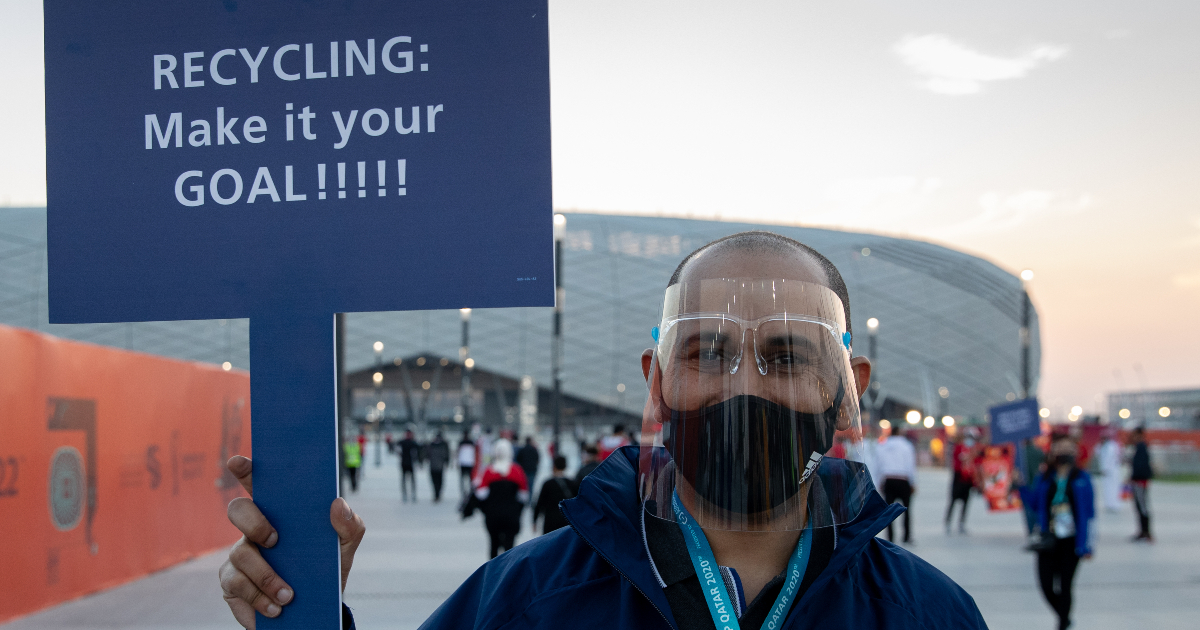

With under two years to go until Qatar hosts the FIFA World Cup™, and with a strong commitment to minimise waste to landfill as part of the FIFA World Cup Qatar 2022™ Sustainability Strategy, tournament organisers are leading the way in the use of behavioural interventions to encourage recycling and reduce littering. Most recently, the FIFA World Cup Qatar 2022 LLC (Q22) enlisted the help of B4Development Foundation (B4D), the region’s first behavioural insights unit, to design and implement a series of interventions at the FIFA Club World Cup Qatar 2020™, which was held from 4-11 February this year.
The tournament included a number of breakthrough measures implemented to minimise waste to landfill. These included ensuring materials could be reused or recycled, providing training to workforce, installing a bin system to facilitate waste segregation by workforce and spectators, and developing partnerships with companies to ensure recycling and composting of waste once if left the competition sites.
“Early on we realised that even with the best efforts, it was crucial to study interventions that would influence people to make proper use of the waste segregation system. Poor waste segregation can result in tons of potentially recyclable waste being sent to landfill.” said José Retana, Q22’s Sustainability Senior Manager.
Three behavioural interventions were implemented at Education City Stadium, which hosted four matches during the tournament, including the final between eventual winners, Bayern Munich, from Germany, and Mexican side, Tigres UANL. The interventions focused on waste disposal and littering. The aim was to gather data on how fans behaved in the presence of specific messaging compared to areas with no messaging.
In one of the interventions, bins were placed throughout the stadium in pairs; one allocated for recyclable material and the other for non-recyclable waste. Above them a sign was placed to encourage fans to make use of them. Herein lies the experiment; above some bins, the message simply consisted of the phrase: “Recycle”, whereas other bins had a more imperative message, such as, “Do Good, Recycle Right”. Aimed to highlight the moral value of recycling and to encourage proper recycling behaviour, the latter message yielded a higher number of correct bin interactions than the simpler message.
“Leveraging behavioural insights promotes evidence-based policies to address challenges with behavioural roots. What may seem like simple interventions from the outside go a long way in guiding people’s everyday decision making in a way that creates greater sustainability impact,” said Dr. Fadi Makki, B4D Director.
“Seeing that fans play such a critical role in the sustainability of a major sporting event such as the FIFA World Cup, implementing behavioural science methods in this area will go a long way in understanding how to best nudge fans in a particular way so that their actions reduce unnecessary waste at the event, and in the future,” added Makki.
Another intervention implemented during the Club World Cup focused on littering. Certain zones of Education City were outfitted with large floor stickers in between rows of seats with the message: “Wait! Please do not leave your waste behind!” Placed in Arabic and English, the messages formed a visually striking reminder to fans not to leave any litter on or around their seats after the end of the match. The results showed that in the zones with the stickers placed on the floor, littering was considerably reduced compared to those areas of the stadium where those messages were not available.
The third and final intervention was a short survey that was deployed across Education City using posters with a QR code, encouraging fans to complete the questionnaire and enter a draw to win a football signed by Qatar Legacy Ambassador Xavi Hernández. Among other things, the survey tested whether providing fans with an individual call to action, such as “Delivering zero waste to landfill tournaments depends on you too!”, would increase their willingness to commit to sustainable behaviours. The results of the survey also provided insight on fans’ levels of knowledge in recycling, and will go a long way in informing the work of Q22 in the lead-up to the FIFA World Cup™.
“Our work with B4D is important on many levels. Not only does it help put fans at the heart of our efforts to deliver a sustainable tournament in 2022, but it also creates knowledge that can enable other sporting events to divert waste from landfill and safeguard the natural environment,” added Retana.
Learn more about the FIFA World Cup Qatar 2022™ Sustainability Strategy.

